A pig’s head sits atop a shelf, tufts of blonde hair sprouting from its taut scalp. Opposite, its chalky, wrinkled heart glows red in a bubbling vat of liquid, locks of thick dark hair and teeth scattered below. A giant screen shows the pig draped in a hospital gown. Is it dead? A surgeon inserts human teeth implants, then hair implants — beautifying the horrifyingly human-like animal.
Chang Chen-shen (張辰申) calls Incarnation Project: Deviation Lovers “a satirical self-criticism, a critique on the fact that throughout our lives we’ve been instilled with ideas and things that don’t belong to us.”
Chang is among 10 finalists in last year’s Taipei Art Awards whose work is currently on display at the Taipei Fine Arts Museum until March 2. It is decisively contemporary — exhibits are written, filmed, even rapped, offering alternative mediums and compelling storytelling.
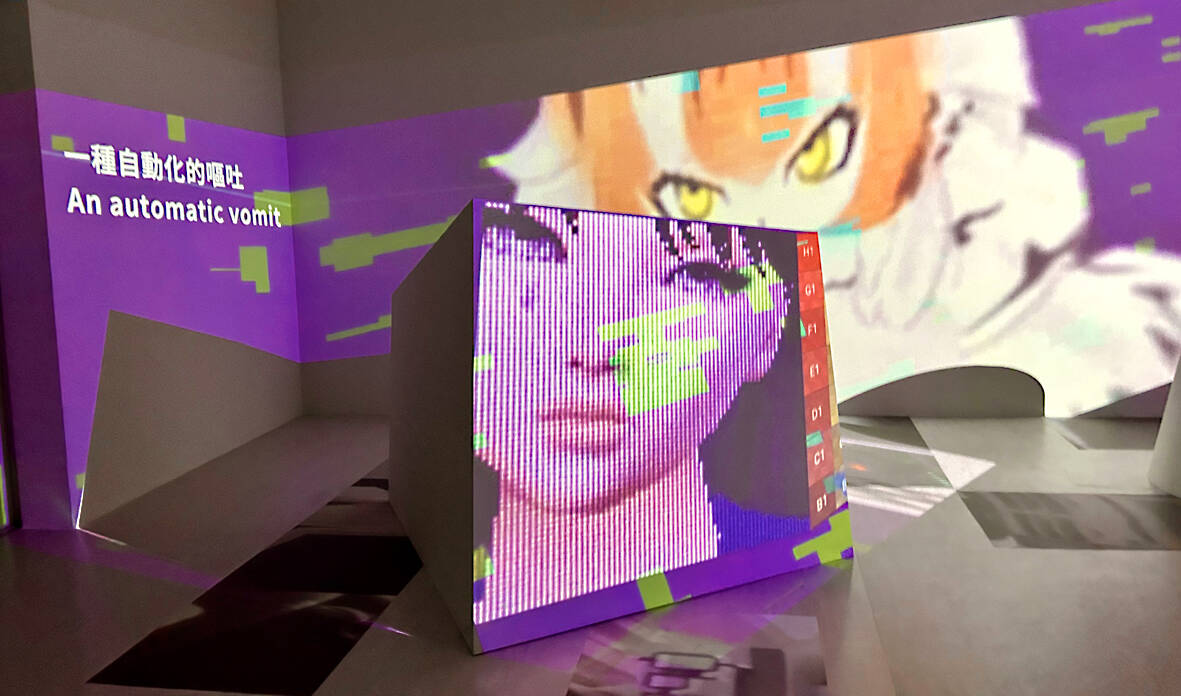
Photo: Hollie Younger, TT
Each artist is given a room of their own, offering up parallel universes from the violent and uncomfortable to the nostalgic and emotive to the futuristic and sci-fi.
The largest and impactful exhibit is Father’s Vital Collection: Heaven and Earth Are My Buildings, And Houses My Clothes, How Come Y’all Step Into My Trousers? by Sim Chang (張哲榕), its contents as delightfully complex as its title.
The space recreates his father’s second-hand book store, with piling yellowed pages and photographs of his father roaming the streets of Taipei collecting pots, pans and all manner of junk.
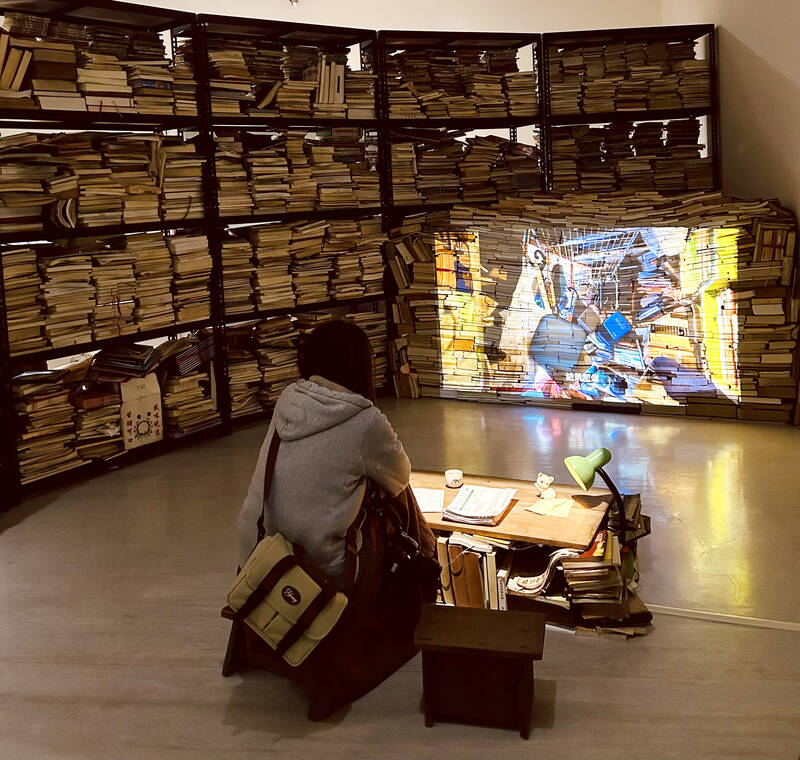
Photo: Hollie Younger, TT
Interspersed with the fading books and photographs, Sim Chang lays bare the soaring highs and crashing lows of his bipolar disorder, which he was diagnosed with while working on this project. Combined, the visitor is immersed in the world created by two minds — one that is at times manic, the other exhibiting the compulsion to hoard.
Sim Chang says his condition has “gifted [him] with something special,” because it enables him to understand and sympathize with his father. It also bestowed him with natural rhyming abilities — abilities that combine in a featured video of him rapping in a frenzy, while sitting on his father’s “vital collection.”
Poyuan Juan’s (阮柏遠) Yes, I’m a simp. Simply in love with... elicits concerns for the incoming age of AI and lives lived digitally. We are warned before entering: “only suitable for over-18s due to scenes of a sexual nature.”
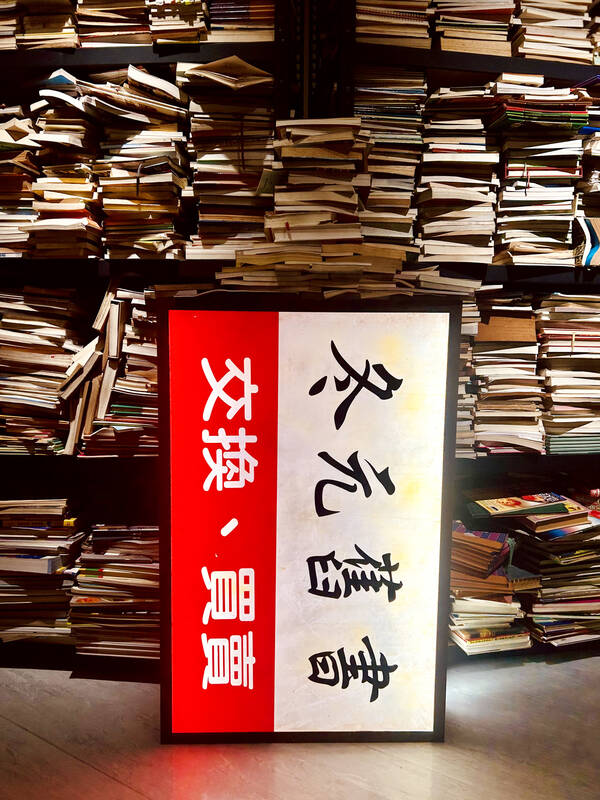
Photo: Hollie Younger, TT
Yet it’s not so much explicit as it is strange.
“An automatic vomit,” an AI sex doll says non-sensically on a glitchy, anime-inspired multiscreen display. The room glows neon green and shades of violet, robotic voices echoing through the exhibit’s clean negative spaces.
Juan’s work explores online romantic relationships experienced through “the emotional linkage of the spirit and the sensory perception of physical contact.”
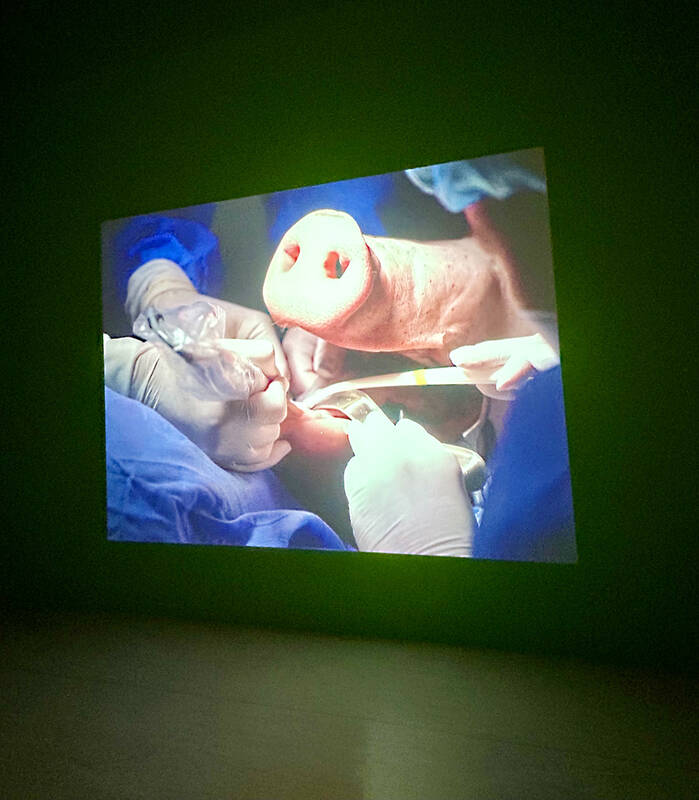
Photo: Hollie Younger, TT
Another screen projects a live video stream, as a wide-eyed, nearly-naked cartoon girl receives thousands of messages from “simps,” a Gen-Z insult for those who obsess over a romantic interest, lusting over a sexualized protagonist while hunched over computer screens.
Oversized iPhone screens flick mindlessly through Instagram reels; the exhibit explores “the overlapping of digital and real spaces, much like being trapped in a social media browsing loop,” Juan says.
The work of the young artists exhibited this year is interconnected in its feeling — futuristic, yet worryingly of the now.
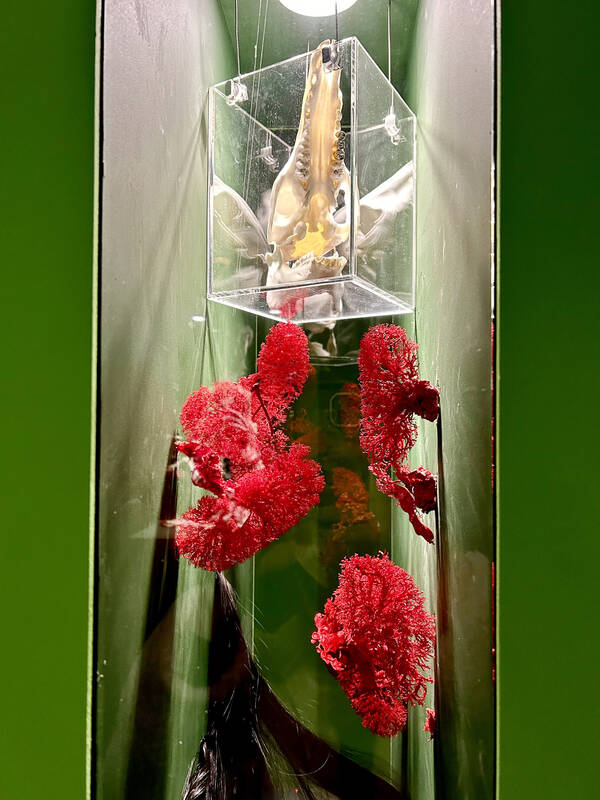
Photo: Hollie Younger, TT

Climate change, political headwinds and diverging market dynamics around the world have pushed coffee prices to fresh records, jacking up the cost of your everyday brew or a barista’s signature macchiato. While the current hot streak may calm down in the coming months, experts and industry insiders expect volatility will remain the watchword, giving little visibility for producers — two-thirds of whom farm parcels of less than one hectare. METEORIC RISE The price of arabica beans listed in New York surged by 90 percent last year, smashing on Dec. 10 a record dating from 1977 — US$3.48 per pound. Robusta prices have

A dozen excited 10-year-olds are bouncing in their chairs. The small classroom’s walls are lined with racks of wetsuits and water equipment, and decorated with posters of turtles. But the students’ eyes are trained on their teacher, Tseng Ching-ming, describing the currents and sea conditions at nearby Banana Bay, where they’ll soon be going. “Today you have one mission: to take off your equipment and float in the water,” he says. Some of the kids grin, nervously. They don’t know it, but the students from Kenting-Eluan elementary school on Taiwan’s southernmost point, are rare among their peers and predecessors. Despite most of

The resignation of Taiwan People’s Party (TPP) co-founder Ko Wen-je (柯文哲) as party chair on Jan. 1 has led to an interesting battle between two leading party figures, Huang Kuo-chang (黃國昌) and Tsai Pi-ru (蔡壁如). For years the party has been a one-man show, but with Ko being held incommunicado while on trial for corruption, the new chair’s leadership could be make or break for the young party. Not only are the two very different in style, their backgrounds are very different. Tsai is a co-founder of the TPP and has been with Ko from the very beginning. Huang has

A few years ago, getting a visa to visit China was a “ball ache,” says Kate Murray. The Australian was going for a four-day trade show, but the visa required a formal invitation from the organizers and what felt like “a thousand forms.” “They wanted so many details about your life and personal life,” she tells the Guardian. “The paperwork was bonkers.” But were she to go back again now, Murray could just jump on the plane. Australians are among citizens of almost 40 countries for which China now waives visas for business, tourism or family visits for up to four weeks. It’s